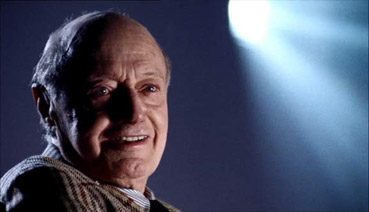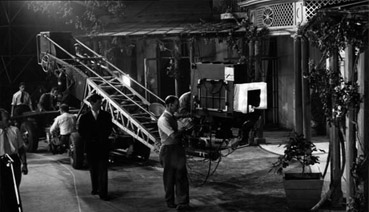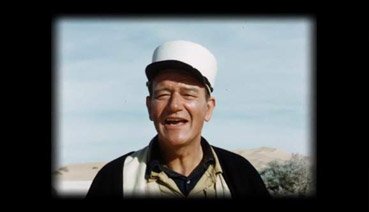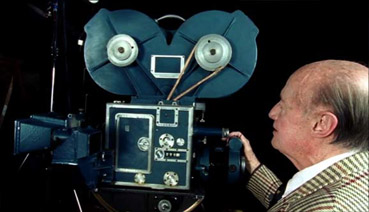| |
"He described his role as 'a diplomatic Jeeves' to the director's Bertie Wooster, but he was no mere gentleman's gentleman. Rather, he was a master in his own right, arguably the finest 'painter with light' Britain has ever produced." |
| |
Wally Hammond, Time Out |
| |
"Take Jack, he's a fucking genius." |
| |
Bill Wall, Michael Powell's Gaffer (Chief Electrician) |
| |
"A couple of weeks ago, I was 91..." "And you're still working!" "Yes, well, not for long. Another 10 years and I'll have to take it easy I think..." |
| |
Jack on the set of the short, Lights2 in 2005 |
All throughout watching this marvellous and lovingly crafted documentary about one of the film industry's truly and insanely gifted gentlemen, I had an insistent voice in my head saying "You know who Jack Cardiff reminds you of, don't you?" and some part of my brain shut down – until right this precise minute when it decided to give me a clue, 'clue' being the apposite word. Apologies for being parochial and referencing something only Brits would understand (or at least those for whom BBC Radio 4 is a daily fix that needs to be aurally absorbed). Jack Cardiff is cinema's answer to Humphrey Lyttleton (the sadly now deceased Jazz trumpeter more famous for chairing the anarchic and surreal radio game show, 'I'm Sorry, I Haven't A Clue'); they were both truly beloved figures throughout their respective industries who were shining examples of simple modest humanity, both special people that others fall over themselves to praise. Kirk Douglas was a fine actor. Now in his nineties, he enjoys a new lease of life on his MySpace page (the oldest blogger in town) and despite being taken down by a stroke (a debilitating knock to anyone to be sure but doubly so for a man, who in his prime, was so intensely physical), he still insisted to be interviewed about Jack Cardiff despite his condition. This is a definition of friendship I get dewy-eyed at. For that alone, I applaud Douglas and after seeing this documentary twice, I more than applaud the subject of his adoration, the brilliant and infinitely humble Jack Cardiff.

Check out this list... Off the top of my head (researched only to check spellings) Vilmos Zsigmond, Darius Khondji, Sven Nykvist, Tak Fujimoto, Caleb Deschanel, Vittorio Storraro, Conrad Hall and Haskell Wexler. Just the sound of their names can take you to exotic climes and startlingly lit vistas and chiaroscuro shaded characters – never mind their actual work. Yes, there are hundreds, perhaps thousands out there, lighting cameramen and women. I'm ashamed I know of no female cinematographers but some research revealed that both Australia and The Wrestler employed female D.P.s. But there are only 2% of women working in that area – it can't just be apprenticeship-required upper body strength, can it, all that lugging of kit when paying your dues? But this review is not about sexual politics, it's about how the gentleman with the most mundane of monikers, heads the afore mentioned exotic sounding group with a select body of work that never fails to astound me – take a bow, Jack Cardiff. Honoured with a lifetime achievement Oscar (the first awarded to a 'mere' cinematographer), this recognition points to such a small part of this extraordinary man's work. It seems he worked with almost every bright shining star of his multitude of eras (this man defines the words 'professional longevity'). From Marilyn Monroe to Orson Welles, Eroll Flynn to John Wayne (Humphrey Bogart's in there too).
This is a sumptuous DVD feast for all of those of us who celebrate cinema's definitive pioneers. Despite his retiring and humble nature, Jack Cardiff was a giant in film history masquerading as an ever-learning canvas-art aware student of film craft. His wondrous 16mm home movies (more about those in a paragraph or two) show the man to be playful, irreverent and (dare I say it) 'fun' to be with. He strikes you as a man who can be relied upon to prick pomposity, to laugh at the un-laughable (he kisses hard-ass director Henry Hathaway and still gets the bugger to smile while doing it) and to shoot the semi-impossible. What he achieved with a specialised crane shooting in Technicolor for Hitchcock on Under Capricorn blows one's mind. The camera is enclosed in a sound proof construction and has to run three 35mm strips concurrently (hence 'three-strip Technicolor'). The crane to move this monster looks like a T. Rex's skeleton and was probably twice as heavy. Just the clip shown makes you reel with astonishment.

He even manages to praise today's craftspeople because despite his role in visualising some of the most enduring cinema ever, he has no curmudgeonly "They don't make 'em like they used to!" attitude. The man's a saint! There's a great reason for saying some mainstream movies used to be great and now, not so great. It's bloody true (as a caveat let me quote Obi Wank Enobi... "...from a certain point of view.") We are losing sight of the past the further we move away from it. It's Groening's Homer's thoughts all over again, a mind being able to keep only a finite number of ideas enclosed and if a new one occurs, an old one is sacrificed. 'Old' movies are described thus as if that three letter word damns the work to some sort of prehistoric oblivion. If only that judgement could be applied to faith based law. As I write the Iranian government is either ignoring or bowing to international pressure to spare the life of a woman who (how dare she?) had sex and survived a near fatal flogging. Stoning should have stayed where it once belonged – the final barbaric word of deeply ignorant people thousands of years ago. Speaking of ignorance...
Have you ever shot a movie or even a home movie? How easy is that? Auto-focus, auto-exposure, auto-pilot. Yes, it wobbles a bit if you don't use a tripod but how hard can being a camera person be? And no doubt you've heard somewhere that camera people (the really highly paid ones) don't even operate the camera! That's an outrage! No. The outrage is the simple ignorance of what being a world class (or even world leading) camera person actually means. We are now in the world of 35mm film so let's banish all thoughts of video as a recording medium. There is no 'auto' here; there is only human judgement, experience and a talent that borders on the supernatural. These people know light. I'm not talking about "Is there enough in this room to record Uncle Bill's best man speech?"
I'm talking about the awful cliché that I swore I wouldn't use in this review – 'painting with light'. Colour is light returned to you – or a lens – after you've bounced light off it. But how much light, what kind of light, from what direction? Lighting is a craft that stubbornly resists public attention and courts its disinterest. The magazine American Cinematographer used to be (and perhaps still is) the only journal dedicated to this hallowed of crafts but after the great invasion of digital post production, the craft has been somewhat broadened if also, on set, simultaneously diluted. After Black Narcissus was released, some people wrote in identifying the locations in India where it was shot. One hundred percent of the movie was shot at Pinewood Studios with matte paintings whose realism startles, examples of a craft redefined by artists at the peak of their game.

The cinematographer also has to have an intimate knowledge of lenses and film-stocks, both respectively the motorway through which the light travels and the bucket that captures it. Film is a photo-chemical process, the action of light on a chemically treated strip of plastic which can yield detail that can truly stun you. And Jack Cardiff was one of the craft's principal stunners. This is how much this documentary impressed me. After seeing it, I went click-simple on Amazon and bought three of his movies and Black Narcissus sits upstairs on Blu-Ray awaiting my undivided. That was a Powell and Pressburger that escaped the glorious box set I reviewed a few years ago and based on the clips featured in Cameraman, I'm salivating to see it in HD... Moonlight becomes some but anticipatory dribble does not become a reviewer of craft/art. VHS memories are hardly sturdy these days.
I must point out that a great deal of creative thought has gone into the construction and style of Cameraman. Director Craig McCall has not simply rounded up those who loved and worked with Cardiff (in Cardiff's case, 'loved' and 'worked with' seem to be synonymous) and interviewed them but has created a work that stands on its own three feet. It's a celebration of a life and a recognition of a man whose humility has profoundly affected others in the most positive light – light; there's that word again. If there is something that you are left with after all the great stuff on display in this film, it's the simplicity of Cardiff's smile. There are loads of clips (of course) from his work (some are of my favourite cinematic moments) and a surfeit of wonderful stills that illustrate Jack's long career and inevitably, there are the Hollywood stories, the behind the scenes tales that have briefly reignited my endless curiosity with 'the real' behind 'the reel'. And they are so wonderfully and almost innocently told. This isn't salacious gossip but stories about real people who just happened to have become iconic.
The real golden nugget in this many gem strewn biography is Cardiff's footage (naturally) but not the three strip Technicolor material, not the ravishing 35mm work he was employed to capture, no. It's his 16mm home movies he shot whilst on location during the shooting of some of Hollywood's most enduring movies. This DVD is worth owning for the actuality of Bogart and company shooting The African Queen (recently – and I hope lovingly – restored on Blu Ray). Anyone interested in cinema... anyone with any curiosity of how we've managed to retard the artistic process should watch this documentary. Jack Cardiff is the guy we'd love to have in charge on our sets. RIP and major kudos to director Craig McCall for skilfully and creatively bringing this wonderful man to light.
Presented in anamorphic 16:9 with a whole host of other formats excerpted (obviously the bulk of the classic clips are in 4:3 Technicolor aspect ratio). I have mentioned the 16mm (it looks so clean, so vibrant and its mute quality makes it also stand out – like a dream state). There are stylised shots of the enormous Technicolor camera and what looked like a conveyor belt (or if you're a Mac user, the Time Machine application) of Jack's life in props and photos. Most of the many interviews have a pleasing formality. You're offered no sub-titles except for those translating the French when we're at the Cannes Film Festival.

Dolby 2.0 and 5.1 are both featured and the sound mix is gentle and respectful with no trouble at all understanding every word.
Interview With Craig McCall by Ian Christie (12' 50")
Director McCall tells of the genesis of the project. This is an entertaining diversion but not half as entertaining as the idea that kept nudging me as I watched... Craig McCall manages to look like a genetic splice of both Penn and Teller. I know that's not exactly respectful but sometimes unbidden thoughts have value (perhaps not in this case). But hats off to the man and it's clear from the actual documentary that he had a wonderful relationship with his subject. And it shows in the work.
Jack's Actress Portraits (3' 59")
Cardiff's own recollections of his still photography – the Marilyn Monroe message and signature are sublime... Renoir lips, indeed. She was "...great fun." I can believe that.
Jack's Behind-The-Scenes Movies (9' 59")
Jack's watching his own 16mm movies (they are all mute which somehow adds to their authenticity). To see images like this (for any film fan) is astounding – it's DVD Extra shooting before DVD became something more than just three letters of the alphabet. Lauren Bacall clowning around with John Huston... Jack Cardiff wearing Humphrey Bogart's toupee! Wonderful, wonderful stuff.
Cinematographer and Director Relationship (11' 33")
It is believed that the central and most important relationship on a movie set is that between the director and cinematographer. On set, I'll buy that. In post, it's the relationship between the director and editor. This DVD extra features an examination of that on set relationship and Alan Parker brings up a very important point – why be so interested in the mechanics of the photography as a director when it's his/her primary job to tell the story? And ace cinematographer Freddie Francis talks about remaking The Elephant Man in colour (a challenge to make it as 'realistic'). Scorsese's on hand to talk through his relationships (with reference to the number of set ups good crews can mange in a working day) and this stirred up a memory of mine. Billy Williams (who shot Gandhi for Richard Attenborough) was shooting on a vast fantasy Lewis Carol set at Elstree in 1985 – the movie was Dream Child, directed by Gavin Millar. On this particular day, the whole cast and crew managed no set ups at all... This stuff takes time! Fast and good cinematographers are rare.
Working With Three-Strip Technicolor (4' 51")
Christopher Challis and Cardiff give us the skinny on Technicolor – absolutely fascinating for film fans. There's a nice gag about yacht ownership as Alan Parker and Cardiff end their interview at Cannes.
Theatrical Trailer (2' 00")
Does what it says on the tin... "Jack was the greatest colour photographer that ever lived..."
Photo Galleries; Jack's Actress Portraits
11 shots of Monroe, Ekberg, Hepburn (Audrey) and Loren. Gorgeous!
Photo Galleries: Production Stills
11 stills from mostly the production of Cameraman but a few glorious ones from the black and white past. I still cannot believe how big those cameras were... They were nicknamed 'The Enchanted Cottage'!
I think I can sum up the value of this DVD with the following... If you love cinema, you'll adore Cameraman. Highly recommended.
|